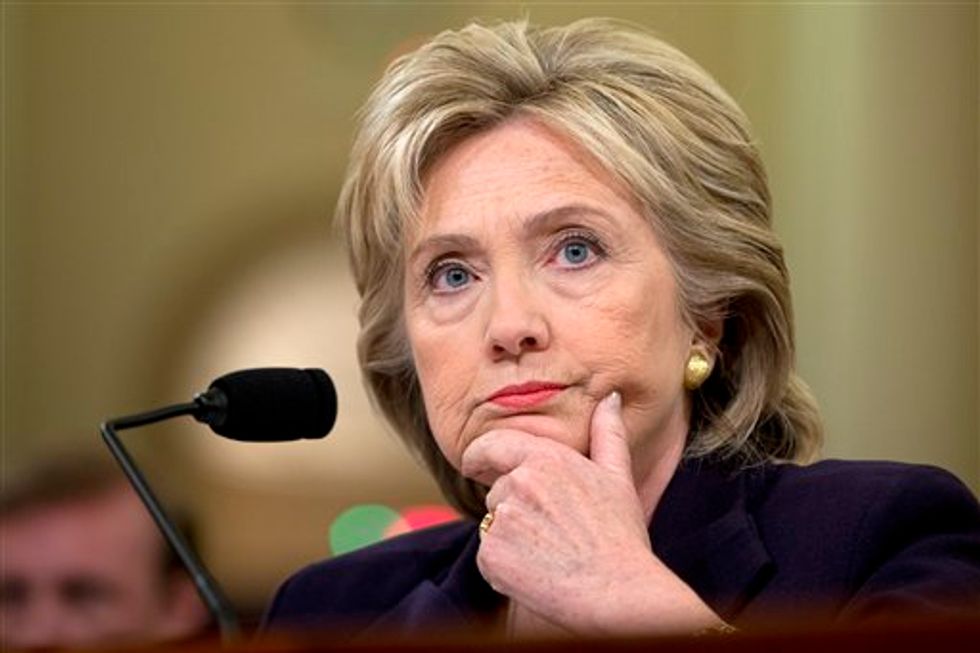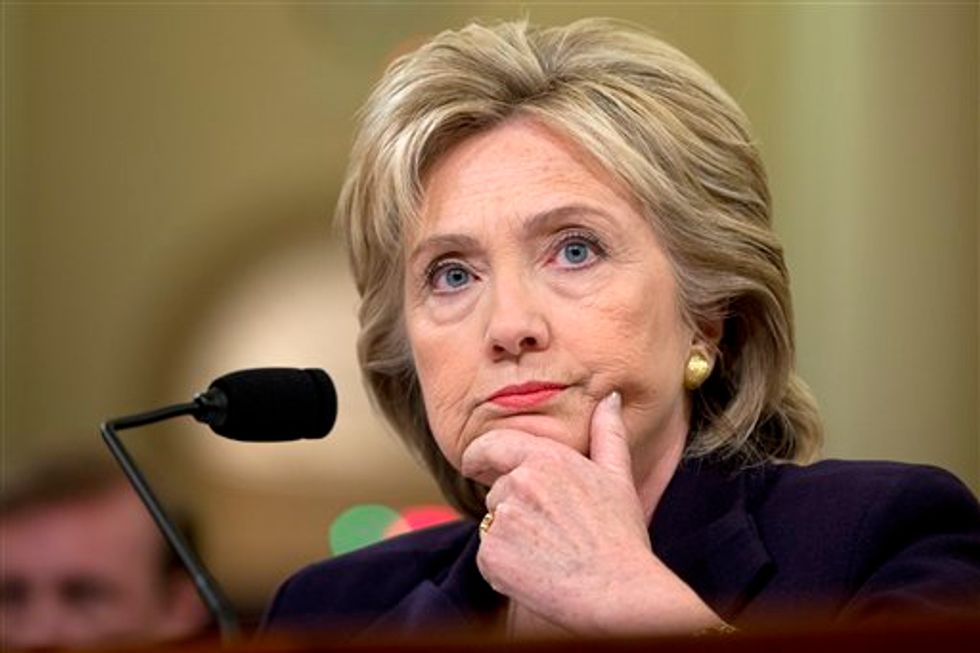
Former Secretary of State Hillary Clinton testifies before the House Select Committee on Benghazi. (AP/Carolyn Kaster)

Leigh Munsil, political editor of TheBlaze, reported over the weekend that Hillary Clinton played the gun control card while campaigning in Ames, Iowa on Saturday.
Clinton's pitch was oh-so-cleverly planned: She assured conservative Iowans that any actions on gun control would "certainly be done consistent with the Constitution and the rights of gun owners." Then she scored points with liberals by slandering opponents of government gun control by shamelessly charging that "one of their highest priorities [is] lowering the age from 14 to let more children be able to legally have guns."

As an added emotional touch, Clinton was accompanied by the sympathetic figure of former U.S. Rep. Gabby Giffords, who was tragically wounded in a 2011 shooting spree, and Giffords' husband, Mike Kelly, who characterized opposition to gun control as a plot by a "powerful corporate lobby" (evil corporations being the left's omnipresent bugaboo).
Let's back off the emotional manipulativeness of political theater and try to take a sober look at the gun control issue. At his town hall meeting about guns last month, President Barack Obama stated that, when it comes to guns, "People occupy different realities."
This doesn't happen often, but I agree with the president 100 percent.
There does happen to be one gun-related point on which Republicans and Democrats are united: We all yearn for the end of murders and mass murders (whether by guns or other means). When it comes to gun ownership, though, we are divided by two fundamentally different worldviews.
Investor's Business Daily recently published a survey that attempted to quantify the differences between Republicans and Democrats on the gun issue. Does increased gun ownership lead to more crime? More than two-thirds of Democrats think it does, while 80 percent of Republicans think that increased gun ownership actually reduces crime. Similarly, "72 percent of Democrats believe that stricter gun control laws would significantly cut crime [but] only 14 percent of Republicans" do.
These starkly divergent beliefs result from Americans differing politically about ideology, philosophically about idealism, and psychologically in terms of what we fixate upon.
In terms of political ideology, Democrats by and large are liberals and progressives who believe in the efficacy of government. To them, government is the great power, the benevolent force, the necessary agent for improving society. By contrast, most Republicans and conservatives share our founding fathers' distrust of government power, as summarized in the Ninth and 10th Amendments.
Knowing that there has been a perennial battle throughout human history between individual rights and liberty on the one hand and government power on the other, our founders adopted the Bill of Rights, including specifically the right to bear arms, and then gave us the Ninth and 10th as the capstone to their vision, making it clear that anywhere there was a doubt, the presumption was to be in favor of individual rights over government power.
In terms of idealism, the progressive worldview includes a quixotic quest for a risk-free world. Whether it's suing somebody because they don't think it's fair that their own stupidity, mistakes, or poor judgment should result in any injury to themselves, or their desire for cradle-to-grave security in the form of Big Government taking care of their every need, the left believes that government can engineer a world in which injury and death can be minimized through government provision of a safe, risk-free world.
Conservatives, by contrast, reject such notions as impossibly unrealistic, understand that a government given too much power to "take care of us" is a threat to liberty, and recognize that the hazards of this world require us to remain mentally alert, adopt prudent precautions, and accept responsibility for our own welfare.
In terms of psychology, we have a classic divide between those who see the glass as half empty and half full. Republicans see the benefits of guns. Interestingly, in 2013 President Obama commissioned the Center for Disease Control to study the impact of guns in America, and the CDC's findings were the opposite of what the anti-gun Obama was hoping for.
“Self-defense can be an important crime deterrent,” said the report. "Guns are an effective and often used crime deterrent...Studies that directly assessed the effect of actual defensive uses of guns (i.e., incidents in which a gun was ‘used’ by the crime victim in the sense of attacking or threatening an offender) have found consistently lower injury rates among gun-using crime victims compared with victims who used other self-protective strategies.”
The CDC study confirmed earlier studies estimating that guns deter criminal aggression anywhere from half a million to 3 million times per year -- a huge number compared to fewer than 11,000-13,000 murders by firearms per year.
I've presented some arguments in defense of gun ownership in the past, but facts, data, and reason rarely change somebody's mindset about guns. Americans are divided by ideology, idealism, and psychology, and that isn't going to change.
Mark Hendrickson is Fellow for Economic and Social Policy with the Center for Vision & Values at Grove City College.
–
TheBlaze contributor channel supports an open discourse on a range of views. The opinions expressed in this channel are solely those of each individual author.